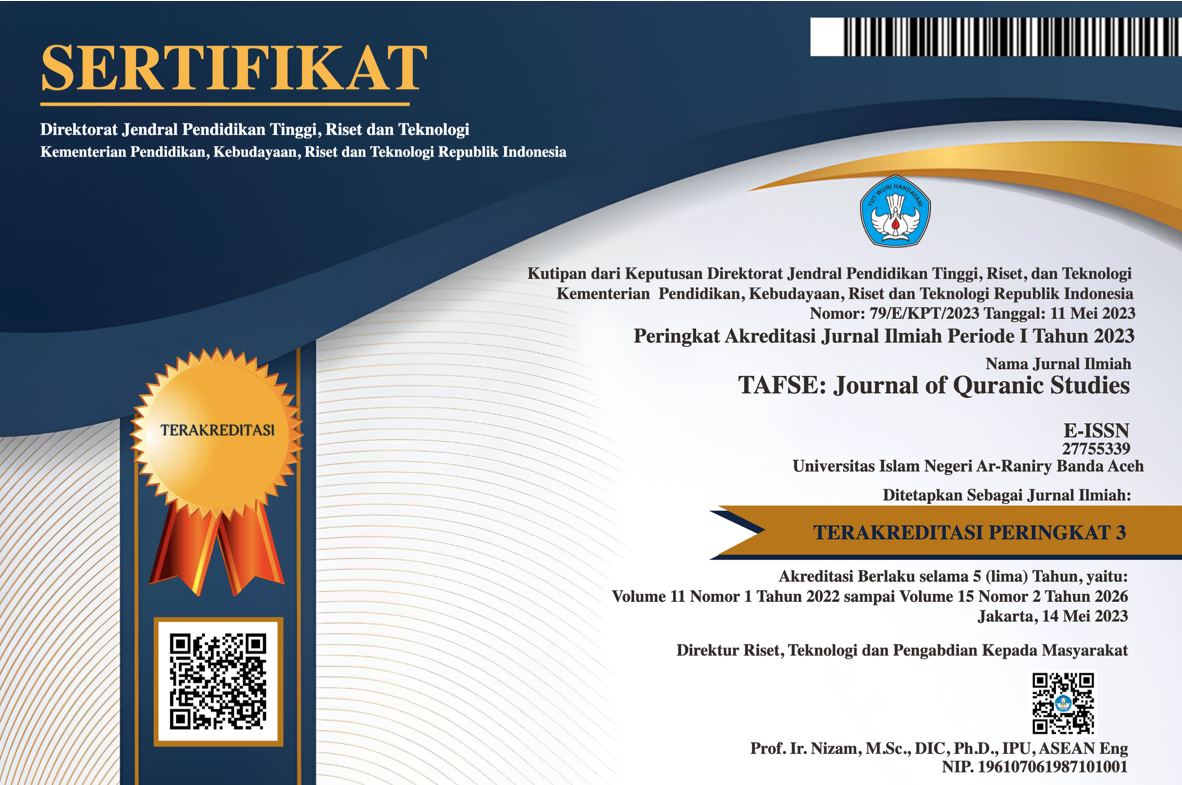Sahiron Syamsuddin’s Contributions to the Methodological Discourse of Al-Qur’an Interpretation in Indonesia
DOI:
https://doi.org/10.22373/tafse.v8i2.20133Keywords:
Sahiron Syamsuddin, Qur’anic Interpretation, Hermeneutics, Ma’nā-cum-MaghzāAbstract
This paper aims to analyze the interpretive methodology of the Al-Qur’an as proposed by Sahiron Syamsuddin, and its relevance in the discourse surrounding Al-Qur’an interpretation methodology in Indonesia. Employing a qualitative methodology with a library research model, this study primarily relies on Sahiron Syamsuddin’s book “Hermeneutics and Development of the Ulumul Qur’an,” among other works. Secondary sources include books and journal articles on hermeneutics, the Qur’an, and classical to modern-contemporary Tafsir literature. These sources are analyzed using descriptive-interpretive methods and historical-philosophical approaches. The findings of this research are twofold: Firstly, Sahiron’s approach aims to contextualize the relevance of the Qur’an in addressing contemporary issues, proposing an interpretive methodology that reconstructs and integrates classical methods with modern approaches, drawing from Western hermeneutic scholars. Secondly, the ma’nā-cum-maghzā methodology is deemed relevant in the current academic milieu for several reasons: it addresses the concerns of progressive Muslim thinkers; it meets the academic demand for evolving Qur’an study methodologies; and its widespread adoption and influence in academic circles in Indonesia, particularly due to its ability to harmonize classical and contemporary interpretations.
Downloads
References
Abdul-Hayyi al-Farmawi. Al-Bidayah Fi-Al-Tafsir Al-Maudhu’i. Kairo: al-Hadharat al-Gharbiyyah, 1977.
Affandi, Yuyun, Maljaul Abror Abdillah, Latifatul Asna, and Mohammed Saad Alhuwaymil. “The Process of Human Creation in The View of HAMKA With The Nazhariyyat Al-Siyaq Approach (Analysis of The Book of Al-Azhar).” International Journal Ihya’ ‘Ulum Al-Din 25, no. 1 (2023): 33–48. https://doi.org/10.21580/ihya.25.1.15006.
Ahmad Syukri Saleh. Metodologi Tafsir Al-Qur’an Kontemporer Dalam Pandangan Fazlur Rahman. Jakarta: Gaung Persada Press, 2007.
Akrimi Matswah. “Tafsir Kontekstual Terhadap Ayat Tentang Larangan Menjadikan Non-Muslim Sebagai Pemimpin Studi Terhadap Surah Al-Mā’idah/5: 5.” Suhuf , 2016, 18.
Fitriatus Shalihah. “Dinamika Pendekatan Ma’na Cum Maghza Dalam Konteks Akademik Indonesia.” Nun: Jurnal Studi Al-Qur’an Dan Tafsir Di Nusantara 8, no. 1 (2022): 85.
Gerhad Ebeling, Hermes. Introduction to Philosophical Hermeneutics. Yale: Yale University Press, 1994.
Hanafi. Hermeneutika Pembebasan: Metodologi Tafsir Menurut Hasan Hanafi. Jakarta: Teraju, 2002.
Hujair A. H. Sanaky. “Metode Tafsir; Perkembangan Metode Tafsirmengikuti Warna Atau Corak Mufassiri.” Al-Mawarid XVIII (2008): 266–266.
Jalaluddin as-Suyuthi. Al-Itqn Fi Ulum Al-Qur’an . 1st ed. Beirut: Muassasah ar-Risalah, 2008.
M. Solahudin. “Pendekatan Tekstual Dan Kontekstual Dalam Penafsiran Al- Qur’an.” Al-Bayan: Jurnal Studi Al-Qur‟an Dan Tafsir 1, 2016, 188.
Muhammad Idris al-Marbawi. Kamus Al-Marbawi. Mesir: Mushthafa al-Babi Al-Halabi, 1926.
Munawir Sjadzali. Ijtihad Dan Kemaslahatan Umat, Dalam Haidar Bagir Dan Syafiq Basri (Ed.), Ijtihad Dalam Sorotan . Bandung: Mizan, 1980.
Mustaqim, Abdul. Epistemolgi Tafsir Kontemporer. Yogyakarta: LkiS Yogyakarta, 2010.
———. Pergeseran Epistemologi Tafsir. Yogyakarta: Pustaka Pelajar, 2008.
Nata, Abuddin. Metodologi Studi Islam. Jakarta: Raja Grafindo Persada, 2011.
Nihayah, and Abdurrahman. “Relevansi Metodologi Tafsir Kontemporer (Studi Atas Pemikiran Muhammad Thalbi).” El-Umdah 1, no. 2 (2018): 222.
Parwanto, Wendi, and Engku Ahmad Zaki Engku Alwi. “The Pattern of Sufism on Interpretation of Q.S. Al-Fatihah in the Tafsir Manuscript By M. Basiuni Imran Sambas, West Kalimantan.” QiST: Journal of Quran and Tafseer Studies 2, no. 2 (2023): 163–79. https://doi.org/10.23917/qist.v2i2.1472.
Richard E. Palmer. Hermeneutika Terj. Musnur Hery Dan Damanhuri Muhammed. Yogyakarta: Pustaka Pelajar, 2005.
Safrudin Edi Wibowo. Hermeneutika Kontroversi Kaum Intelektual Indonesia . Yogyakarta: CV. Istana Agency, 2019.
Sahiron Syamsuddin. Hermeneutika Al-Qur’an Mazhab Yogya . Yogyakarta: Islamika, 2003.
———. Pendekatan Maʿnā-cum-maghzā Atas Al-Qur’an Dan Hadis: Menjawab Problematika Sosial Keagamaan Di Era Kontemporer. Yogyakarta: Lembaga Ladang Kata, 2020.
Syamsul Hidayat. “Distorsi Penafsiran Terhadap Al-Quran: Telaah Atas Kebatilan Pendekatan Hermeneutika Terhadap Al-Quran.” Profetika Jurnal Studi Islam 9, no. 2 (2007): 201.
Uun Yusufa. “Kerangka Paradigmatis Metode Tafsir Tematik Akademik: Kasus Disertasi UIN Yogyakarta Dan Jakarta.” Journal of Qur’an and Hadith Studies 4, no. 2 (2015): 202.
Wendi Parwanto. “THEOLOGICAL , ECOLOGICAL , AND HUMANIST EDUCATIONAL VALUES IN THE TAFSIR OF SURAH AL-FALAQ : HAMKA’S PERSPECTIVE.” El-Tarbawi 15, no. 2 (2022): 199–224.
Downloads
Published
Issue
Section
License
Authors who publish with this journal agree to the following terms:
- Authors retain copyright and grant the journal right of first publication with the work simultaneously licensed under a Creative Commons Attribution License (CC BY NC 4.0) that allows others to share the work with an acknowledgment of the work's authorship and initial publication in this journal.
- Authors are able to enter into separate, additional contractual arrangements for the non-exclusive distribution of the journal's published version of the work (e.g., post it to an institutional repository or publish it in a book), with an acknowledgment of its initial publication in this journal.
- Authors are permitted and encouraged to post their work online (e.g., in institutional repositories or on their website) prior to and during the submission process, as it can lead to productive exchanges, as well as earlier and greater citation of published work (See The Effect of Open Access).





